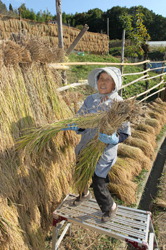Nuke crisis has Fukushima
farmer worried over next year's crop, erosion of community

Japanese Nuclear Meltdown
EMF Radiation Protection
Magnetic Field Meters
Rice grown in Fukushima Prefecture, host to the
disaster-stricken Fukushima No. 1 nuclear plant, is
officially safe to eat. All samples provided for testing
registered radioactive cesium contamination below the
government-mandated maximum, meaning the grain is cleared
for shipment and will appear in supermarkets across Japan.
Many farmers in the prefecture, however, have no rice to
ship, as they gave up on planting a crop this year after the
breakout of the nuclear crisis.
One such farmer is 61-year-old Yoko Kowaguchi, who owns a
7-hectare property with her husband in the Ohisa district of
Iwaki, Fukushima Prefecture, about 30 kilometers south of
the nuclear plant. Her husband, left disabled by a
combination of illness and a car accident three years ago,
can no longer help her, and she does all the farm work
herself.
"I never stopped working the fields, even when I was
pregnant," she tells the Mainichi of her 38 years on the
farm. She also says that, if worst comes to worst, her rice
paddies may lie fallow again next year, too. Still, she
cannot just abandon them, and this day finds her in the
fields, grass cutter in hand.
The Kowaguchi farm has never come under the indoor advisory
or evacuation zones; those ominous circles around the
nuclear plant that have become regular fare on news sites.
However the district of Iwaki right next door, Hisanohama,
was part of the indoor advisory zone. This was too close for
comfort, and the Kowaguchis fled the area, bouncing among
the homes of their daughters and friends in the Fukushima
Prefecture cities of Koriyama and Kitakata.
On April 22, the indoor advisory for Hisanohama was lifted,
and a few days later Kowaguchi received word from the local
agricultural cooperative that planting could go ahead.
"But we hadn't prepared seeds for planting," says Kowaguchi.
"Also, we didn't know if anyone would buy our rice if
radioactive substances were found in it. The situation was
just not right to go ahead with planting." She was not
alone. Some 90 percent of farmers in her community did not
plant crops this year.
In July, Kowaguchi and 84 other local farm families created
the "Nochi o mamoru-kai," or the "farmland protection
association," aimed at making sure a rice crop will be
planted next spring. The association requested a radiation
testing organization screen soil and unhulled rice from the
area's farms. The results showed some of the rice samples
were contaminated with very small amounts of cesium.
The prefectural government is now considering whether to
lift restrictions on rice planting next year, and Kowaguchi
has laid in a supply of seeds in preparation. Even so, she
is worried.
"I understand the problem of internal radiation exposure to
young people," she says. "Even if a tiny amount of
radioactive materials could end up in the rice..." she adds,
trailing off.
Opinions on planting differ from household to household, and
the phrase "What're you going to do?" has become a set
feature of any conversation among local farmers. There are
apparently some families who have even decided to give up
farming because of the nuclear disaster -- yet another blow
to an agricultural community where the aging population was
already a serious problem before March 11.
"If people keep giving up farming, soon this community will
be full of nothing but the elderly," Kowaguchi worries.
"That's why I was thinking of doing my best to work the land
into my old age. I never thought I would agonize over
something like this. It's a real pity," Kowaguchi says,
before turning her attention back to weed-cutting, her
expression dark.
http://www.emfnews.org/store
|